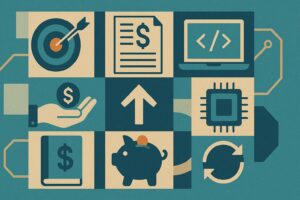Reading time: 5 minutes
Published: July 2, 2025
Modified: August 23, 2025
As an engineer, I’ve been accustomed to solving complex problems and working with precision. But when it comes to personal finance, the equations don’t always boil down to simple math; there’s an accompanying set of personal skills and focus required to manage your personal finances. Although written with engineers in mind, these tips can benefit anyone looking to apply logical strategies to personal finance.

- Key Takeaways
- 1. Understand Your Financial Goals
- 2. Create a Detailed Budget
- 3. Invest Wisely
- 4. Embrace Technology
- 5. Keep Learning About Finance
- 6. Plan for Retirement
- 7. Adopt Frugal Habits
- 8. Review and Adjust Regularly
- 9. Understand Tax Implications
- 10. Grow Your Income Strategically
- 11. Prioritize Savings and Emergency Funds
- Conclusion
Key Takeaways
- Engineers can leverage their analytical skills to optimize personal finances.
- Budgeting, investing, and saving are crucial components of financial success.
- Utilizing technology and tools can streamline financial management.
- Continual learning and adaptation are vital for financial growth.
1. Understand Your Financial Goals
Before you can build a successful financial strategy, you need to know what you’re aiming for. Are you saving for a house, planning for retirement, or perhaps considering a career break? Setting clear financial goals helps you create a roadmap for your future.
Think of it as designing an architecture for your financial life, where each goal is a different component of the overall structure (think of it as financial “object-oriented programming!”).
2. Create a Detailed Budget
Your ability to dissect complex problems and devise solutions can be a powerful asset when managing your finances. Engineers are no strangers to detailed planning, and budgeting is no different. Start by tracking your income and expenses to understand where your money goes each month. Begin by using spreadsheets or budgeting apps to categorize your spending and identify areas for improvement.
Eventually, managing your financial life through spreadsheets becomes unsustainable as your financial situation becomes more complex. That’s why I subscribed to the Boldin ↗ (affiliated link) financial planner. This planner not only simplified my financial life but also provided insights into taxes, future cash flow, and personalized strategies to keep me on track.
3. Invest Wisely
Investing might seem intimidating, but it’s crucial for building wealth over time. As an engineer, you can apply your problem-solving skills to research and understand different investment options. Consider diversifying your portfolio to mitigate risk and increase potential returns, and don’t be afraid to seek professional advice if needed.
Learn how one simple strategy can protect your portfolio long-term.
4. Embrace Technology
Leverage technology to simplify your financial management. Use apps and tools to automate savings, track investments, and manage expenses. As someone who likely appreciates efficiency, you’ll find that these tools can save you both time and stress.
For example, a Strong Password Generator can help you securely manage your online financial accounts. As an engineer, you’ve surely become accustomed to protecting numerous accounts associated with your development process and workflow, so continue to maintain that discipline with your own personal financial accounts.
For related information, check out these tips to secure financial accounts like a developer.
5. Keep Learning About Finance
The financial landscape is always changing, much like the tech world. Stay informed about new financial products, tax regulations, and investment opportunities. Reading articles, attending workshops, and following personal finance blogs (like Raining Pennies!) can keep you ahead of the curve.
6. Plan for Retirement
It’s never too early to start planning for retirement. As an engineer, you might have access to employer-sponsored retirement plans, which can be an excellent foundation. Consider additional retirement savings vehicles, like 401(k)s, IRAs, or Roth IRAs, to maximize your retirement funds.
As you approach retirement, familiarize yourself with RMD rules and other retirement account regulations to ensure you’re making the most of your savings.
7. Adopt Frugal Habits
Adopting frugal habits doesn’t mean depriving yourself of joy. It’s about making conscious choices that align with your financial goals. If you’re looking for inspiration, consider exploring some frugal habits worth keeping ↗ that can help you save money without sacrificing quality of life.
8. Review and Adjust Regularly
Your financial plan should be as dynamic as your engineering projects. Regularly review your budget, investments, and goals to ensure they still align with your current lifestyle and aspirations. Life changes, and so should your financial strategies. Whether it’s a new job, a relocation, or a family addition, be ready to tweak your plan as needed.
9. Understand Tax Implications
Taxes can be complex, but understanding them is crucial for maximizing your income. Stay informed about key tax changes and use tax-advantaged accounts like HSAs, IRAs, or 401(k)s to reduce your tax burden. Additionally, consider strategies like tax-loss harvesting to minimize your tax bill.
10. Grow Your Income Strategically
As an engineer, you have many opportunities to increase your income. Consider taking on freelance projects, pursuing a side hustle, or negotiating a raise. Explore proven ways to boost your income and enhance your financial stability.
11. Prioritize Savings and Emergency Funds
Consistent savings are the foundation of financial security. Aim to save a portion of your income each month and build an emergency fund to cover unexpected expenses. This financial buffer will provide peace of mind and protect you from unforeseen financial challenges.
Conclusion
Managing your personal finances doesn’t have to be overwhelming. By applying the analytical and problem-solving skills you use every day as an engineer, you can create a robust financial strategy tailored to your needs.
And if you’re just getting started, why not pick two or three tips to implement this week?
Remember, the journey to financial success is a marathon, not a sprint. Keep learning, stay curious, and adapt as you go. Your future self will thank you.
I believe this web site contains very good indited subject matter blog posts.